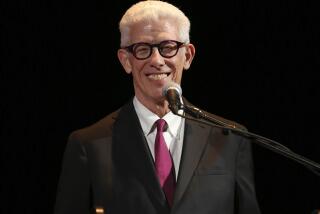Walter Goldschmidt dies at 97; longtime UCLA anthropology professor
- Share via
Walter Goldschmidt, an anthropologist and longtime UCLA professor whose studies ranged from California farmers to East African cultures, has died. He was 97.
Goldschmidt died Sept. 1 at Huntington Memorial Hospital in Pasadena after a short illness, said his son, Mark.
He came to UCLA in 1946 and over the years was a prolific author who “was really looking for the motivation for human behavior,” his son said.
“He said to me something I thought was very profound: ‘You know, there’s only so many personality types in the world but an infinite number of cultures. Some personalities work better in some cultures than in others.’ ”
Discussing his last book, “The Bridge to Humanity: How Affect Hunger Trumps the Selfish Gene,” in 2005, Goldschmidt told The Times that people are “pushed to wanting to do, and get pleasure out of doing, things that turn out to be good.... We get pleasure out of doing these things because we have a hunger for affect.”
Walter Rochs Goldschmidt was born Feb. 24, 1913, in San Antonio to Hermann and Gretchen Goldschmidt.
“I was raised an atheist with a high sense of morality, too much morality,” he told a Times reporter in 1990. “That’s what gave me the questions” that led to a career in anthropology.
He earned bachelor’s and master’s degrees in anthropology at the University of Texas by 1935, and his doctorate at UC Berkeley in 1942.
In 1937, he married Beatrice Gale, a psychiatric social worker who assisted in his research and took photographs for some of his books. They honeymooned among the Hupa, a Native American tribe in Northern California that Goldschmidt was studying.
His studies of California farming communities compared life on small family farms to areas controlled by agribusiness, showing that the family farm communities had more social institutions and a better quality of life. Those findings were included in his 1947 book “As You Sow.”
East Africa was another focus of Goldschmidt’s work, particularly the Sebei tribal group in Uganda. His first visit was in 1953, with his wife and son.
In the 1960s, Goldschmidt directed a study of four East African tribes. The study examined the tribes’ cultural institutions, such as marriage and land tenure, to show how they adapted when lifestyles within the tribes changed.
Phillip Carl Salzman, writing in the journal Nomadic Peoples in 2003, said Goldschmidt “has enriched nomadic studies by bringing his particularly American sensibility” to the study of East African peoples.
Goldschmidt spent two years in the 1950s helping produce a program called “Ways of Mankind” for the Canadian Broadcasting Corp. The program dealt with such topics as music, religion and ethics.
Goldschmidt was president of the American Anthropological Assn. and editor of the journal American Anthropologist. He became an emeritus professor of anthropology and psychiatry in the early 1980s.
In addition to his son Mark, Goldschmidt is survived by a grandchild. Goldschmidt’s wife died in 1991. Another son, Karl, died in 2001.
A memorial service will be held Oct. 26 at UCLA. For more information, call the anthropology department’s Olivia Ale at (310) 825-1565.
More to Read
Start your day right
Sign up for Essential California for the L.A. Times biggest news, features and recommendations in your inbox six days a week.
You may occasionally receive promotional content from the Los Angeles Times.




